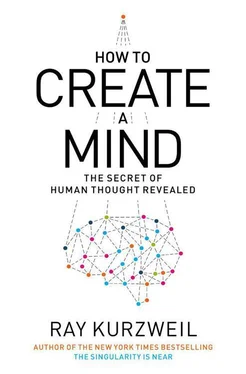We don’t have to look to the universe to see future events that are determined yet unpredictable. None of the scientists who have worked on Watson can predict what it will do, because the program is just too complex and varied, and its performance is based on knowledge that is far too extensive for any human to master. If we believe that humans exhibit free will, then it follows that we have to allow that future versions of Watson or Watson-like machines can exhibit it also.
My own leap of faith is that I believe that humans have free will, and while I act as if that is the case, I am hard pressed to find examples among my own decisions that illustrate that. Consider the decision to write this book—I never made that decision. Rather, the idea of the book decided that for me. In general, I find myself captive to ideas that seem to implant themselves in my neocortex and take over. How about the decision to get married, which I made (in collaboration with one other person) thirty-six years ago? At the time, I had been following the usual program of being attracted to—and pursuing—a pretty girl. I then fell in love. Where is the free will in that?
But what about the little decisions I make every day—for example, the specific words I choose to write in my book? I start with a blank virtual sheet of paper. No one is telling me what to do. There is no editor looking over my shoulder. My choices are entirely up to me. I am free— totally free —to write whatever I…
Uh, grok … Grok ? Okay, I did it—I finally applied my free will. I was going to write the word “want,” but I made a free decision to write something totally unexpected instead. This is perhaps the first time I’ve succeeded in exercising pure free will.
Or not.
It should be apparent that that was a display not of will, but rather of trying to illustrate a point (and perhaps a weak sense of humor).
Although I share Descartes’ confidence that I am conscious, I’m not so sure about free will. It is difficult to escape Schopenhauer’s conclusion that “you can do what you will, but in any given moment of your life you can will only one definite thing and absolutely nothing other than that one thing.” 20 Nonetheless I will continue to act as if I have free will and to believe in it, so long as I don’t have to explain why.
A philosopher once had the following dream.
First Aristotle appeared, and the philosopher said to him, “Could you give me a fifteen-minute capsule sketch of your entire philosophy?” To the philosopher’s surprise, Aristotle gave him an excellent exposition in which he compressed an enormous amount of material into a mere fifteen minutes. But then the philosopher raised a certain objection which Aristotle couldn’t answer. Confounded, Aristotle disappeared.
Then Plato appeared. The same thing happened again, and the philosopher’s objection to Plato was the same as his objection to Aristotle. Plato also couldn’t answer it and disappeared.
Then all the famous philosophers of history appeared one by one and our philosopher refuted every one with the same objection.
After the last philosopher vanished, our philosopher said to himself, “I know I’m asleep and dreaming all this. Yet I’ve found a universal refutation for all philosophical systems! Tomorrow when I wake up, I will probably have forgotten it, and the world will really miss something!” With an iron effort, the philosopher forced himself to wake up, rush over to his desk, and write down his universal refutation. Then he jumped back into bed with a sigh of relief.
The next morning when he awoke, he went over to the desk to see what he had written. It was, “That’s what you say.”
Raymond Smullyan, as quoted by David Chalmers 21
What I wonder about ever more than whether or not I am conscious or exercise free will is why I happen to be conscious of the experiences and decisions of this one particular person who writes books, enjoys hiking and biking, takes nutritional supplements, and so on. An obvious answer would be, “Because that’s who you are.”
That exchange is probably no more tautological than my answers above to questions about consciousness and free will. But actually I do have a better answer for why my consciousness is associated with this particular person: It is because that is who I created myself to be.
A common aphorism is, “You are what you eat.” It is even more true to say, “You are what you think.” As we have discussed, all of the hierarchical structures in my neocortex that define my personality, skills, and knowledge are the result of my own thoughts and experiences. The people I choose to interact with and the ideas and projects I choose to engage in are all primary determinants of who I become. For that matter, what I eat also reflects the decisions made by my neocortex. Accepting the positive side of the free will duality for the moment, it is my own decisions that result in who I am.
Regardless of how we came to be who we are, each of us has the desire for our identity to persist. If you didn’t have the will to survive, you wouldn’t be here reading this book. Every creature has that goal—it is the principal determinant of evolution. The issue of identity is perhaps even harder to define than consciousness or free will, but is arguably more important. After all, we need to know what we are if we seek to preserve our existence.
Consider this thought experiment: You are in the future with technologies more advanced than today’s. While you are sleeping, some group scans your brain and picks up every salient detail. Perhaps they do this with blood cell–sized scanning machines traveling in the capillaries of your brain or with some other suitable noninvasive technology, but they have all of the information about your brain at a particular point in time. They also pick up and record any bodily details that might reflect on your state of mind, such as the endocrine system. They instantiate this “mind file” in a nonbiological body that looks and moves like you and has the requisite subtlety and suppleness to pass for you. In the morning you are informed about this transfer and you watch (perhaps without being noticed) your mind clone, whom we’ll call You 2. You 2 is talking about his or her life as if s/he were you, and relating how s/he discovered that very morning that s/he had been given a much more durable new version 2.0 body. “Hey, I kind of like this new body!” s/he exclaims.
The first question to consider is: Is You 2 conscious? Well, s/he certainly seems to be. S/he passes the test I articulated earlier, in that s/he has the subtle cues of being a feeling, conscious person. If you are conscious, then so too is You 2.
So if you were to, uh, disappear, no one would notice. You 2 would go around claiming to be you. All of your friends and loved ones would be content with the situation and perhaps pleased that you now have a more durable body and mental substrate than you used to have. Perhaps your more philosophically minded friends would express concerns, but for the most part, everybody would be happy, including you, or at least the person who is convincingly claiming to be you.
So we don’t need your old body and brain anymore, right? Okay if we dispose of it?
You’re probably not going to go along with this. I indicated that the scan was noninvasive, so you are still around and still conscious. Moreover your sense of identity is still with you, not with You 2, even though You 2 thinks s/he is a continuation of you. You 2 might not even be aware that you exist or ever existed. In fact you would not be aware of the existence of You 2 either, if we hadn’t told you about it.
Читать дальше












